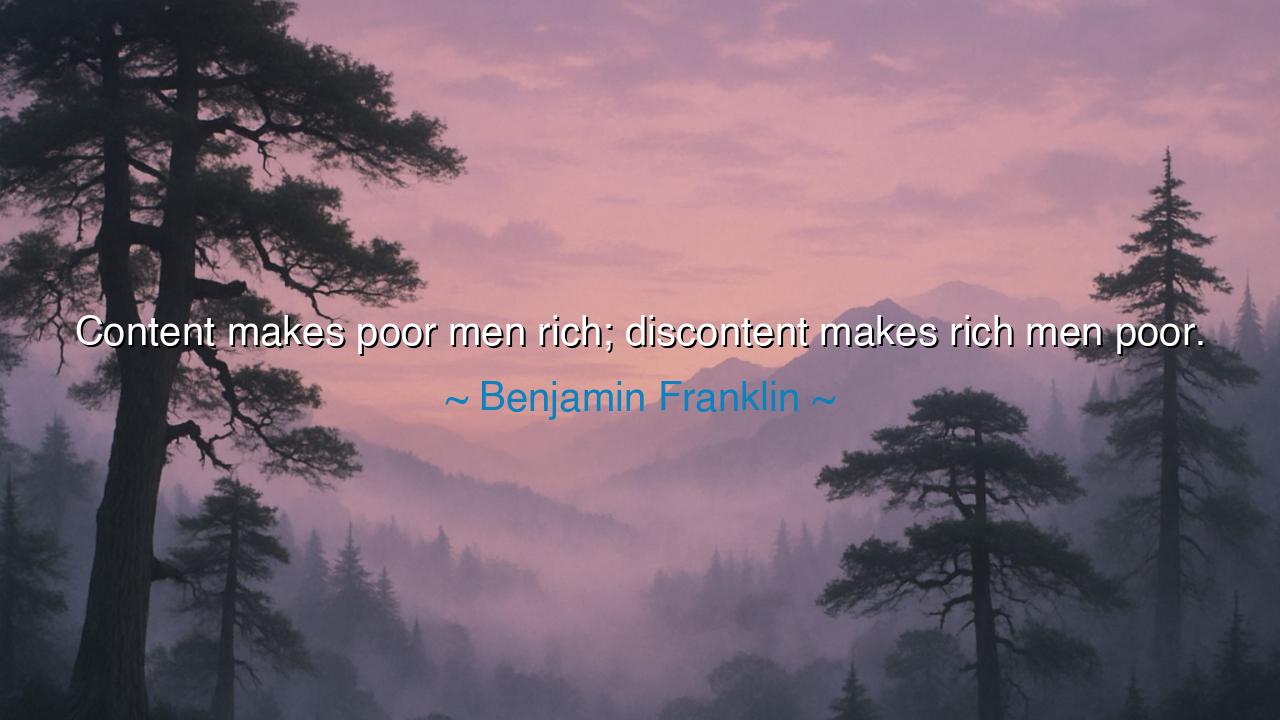
Content makes poor men rich; discontent makes rich men poor.






In the vast dance of fortune and fate, there are two forces that govern the soul of mankind: contentment and discontent. The great philosopher and statesman Benjamin Franklin once remarked, “Content makes poor men rich; discontent makes rich men poor.” These words, simple yet profound, reveal a truth that spans the ages—wealth is not merely a matter of material abundance, but of the mind and the spirit. Franklin, like the sages before him, understood that true riches come not from what we possess in our hands, but from what we hold in our hearts.
The ancients spoke often of the pursuit of contentment as the highest form of wealth. Aristotle, in his search for the good life, posited that happiness, or eudaimonia, was not found in the accumulation of material goods, but in the alignment of one’s life with virtue and purpose. To live well, according to Aristotle, was to accept one’s circumstances, to find peace in the present moment, and to cultivate a soul that was satisfied with enough. Socrates, too, was a master of this art, teaching his disciples that true wisdom lay not in acquiring wealth or status, but in understanding the wealth of the soul. He famously said, “He is richest who is content with the least.” Franklin’s words echo this timeless truth—contentment is the true wealth of the soul, and when we cultivate it, we are rich, regardless of our material circumstances.
The story of Diogenes, the Greek philosopher, serves as a powerful example of this idea. Diogenes, the founder of Cynicism, was often seen living in the streets, with little more than a simple barrel for shelter. Despite his outward poverty, he was unbothered by the luxuries and comforts that others sought. He had no need for possessions, no desire for status, for he had discovered a secret that many never understand: true freedom and wealth lie in the absence of desire for things that do not bring true happiness. Diogenes would walk the streets of Athens, content in his simplicity, often challenging the wealthy citizens of the city to question their own pursuits. His discontent with the world’s obsession with material goods made him, in his own way, one of the wealthiest men to ever live.
Yet, Franklin's second point carries equal weight: that discontent makes the rich poor. This, too, has been a lesson passed down through the ages. In the lives of many kings, emperors, and rulers, we see that the more they desired, the more they lacked. Consider the life of King Midas, who, according to myth, was granted the power to turn everything he touched into gold. At first, this seemed a great blessing—until Midas realized that his greed had transformed his food into gold, his touch into a curse. What seemed like an ultimate form of wealth became his prison, as he could not even eat or drink without fear of his gold-laden touch. Midas’s discontent with what he had turned him into a slave of his own desires, and he learned too late that true wealth lies not in possession, but in the freedom to enjoy what life offers in its simplest forms.
History has shown us countless examples of individuals who were wealthy in material goods but poor in spirit because of their discontent. The Roman emperor Nero, with all his power and riches, was never satisfied. His insatiable desire for more led him down a path of excess and destruction, eventually bringing about his own downfall. Nero’s discontent with his position of power led him to cruelty, and in the end, he was left with nothing but his own misery. The lesson of discontent is clear: it is not the amount of wealth one accumulates, but the peace of mind one possesses, that determines the true richness of life.
So, what lesson do we draw from Franklin’s timeless words? The key is to seek a life of balance—to cultivate a heart that is content, regardless of material circumstances. Contentment comes not from having everything one wants, but from wanting less and appreciating what we already have. This does not mean that we must abandon ambition or strive for improvement, but rather that we must understand that true richness lies in the peace that comes from within, not in external circumstances. The richest among us are not those with the most possessions, but those who find joy in simple things, who are at peace with who they are, and who value what truly matters—love, health, wisdom, and inner peace.
As we move through our lives, let us reflect on these words of Benjamin Franklin and the wisdom of the ancients. Let us ask ourselves: Are we truly content with what we have, or do we chase after things that can never satisfy the deeper hunger of the soul? Let us find gratitude in the simple moments, seek contentment in the present, and remember that discontent, no matter how much wealth we possess, will always leave us poor. In this way, we can be rich in the ways that truly matter, cultivating a life of peace, joy, and purpose—the greatest forms of wealth a person can ever possess.






AAdministratorAdministrator
Welcome, honored guests. Please leave a comment, we will respond soon